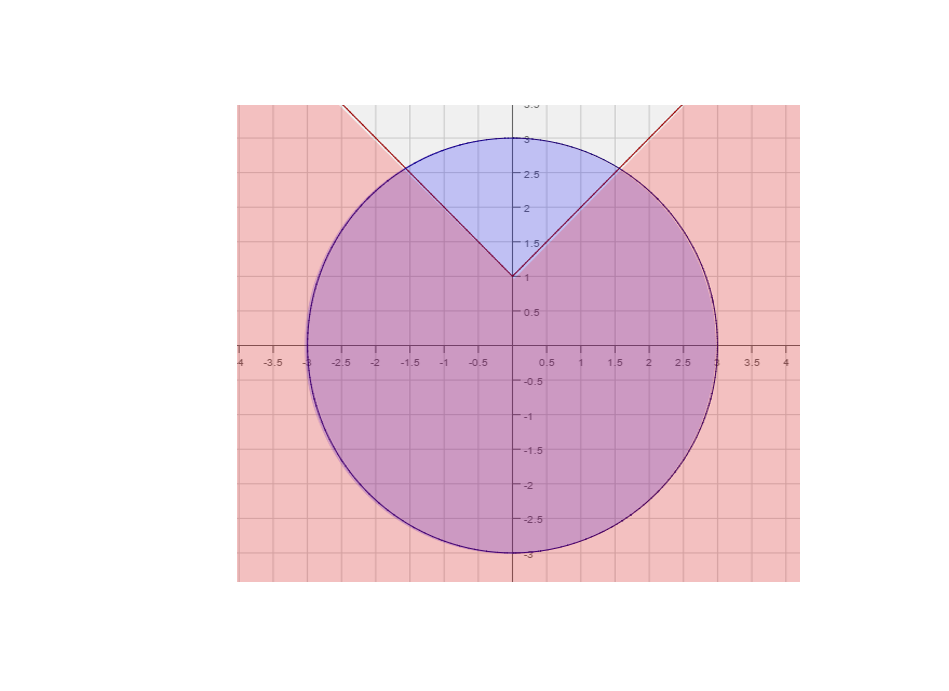Difference between revisions of "008A Sample Final A, Question 5"
Jump to navigation
Jump to search
| (3 intermediate revisions by the same user not shown) | |||
| Line 2: | Line 2: | ||
{| class="mw-collapsible mw-collapsed" style = "text-align:left;" | {| class="mw-collapsible mw-collapsed" style = "text-align:left;" | ||
| − | ! Foundations | + | ! Foundations: |
|- | |- | ||
|1) What do the graphs of <math>y=\vert x\vert + 1</math>, and <math>x^2 + y^2 = 9</math> look like? | |1) What do the graphs of <math>y=\vert x\vert + 1</math>, and <math>x^2 + y^2 = 9</math> look like? | ||
| Line 12: | Line 12: | ||
|1) The first graph looks like a V with the vertex at (0, 1), the latter is a circle centered at the origin with radius 3. | |1) The first graph looks like a V with the vertex at (0, 1), the latter is a circle centered at the origin with radius 3. | ||
|- | |- | ||
| − | |2) Since the Y-value must be less than <math>\vert x\vert + 1</math>, shade below the V. For the circle | + | |2) Since the Y-value must be less than <math>\vert x\vert + 1</math>, shade below the V. For the circle shade the inside. |
|} | |} | ||
| Line 18: | Line 18: | ||
{| class="mw-collapsible mw-collapsed" style = "text-align:left;" | {| class="mw-collapsible mw-collapsed" style = "text-align:left;" | ||
| − | ! Step 1: | + | ! Step 1: |
|- | |- | ||
|First we replace the inequalities with equality. So <math>y = \vert x\vert + 1</math>, and <math>x^2 + y^2 = 9</math>. | |First we replace the inequalities with equality. So <math>y = \vert x\vert + 1</math>, and <math>x^2 + y^2 = 9</math>. | ||
| Line 26: | Line 26: | ||
{| class="mw-collapsible mw-collapsed" style = "text-align:left;" | {| class="mw-collapsible mw-collapsed" style = "text-align:left;" | ||
| − | ! Step 2: | + | ! Step 2: |
|- | |- | ||
|Now that we have graphed both functions we need to know which region to shade with respect to each graph. | |Now that we have graphed both functions we need to know which region to shade with respect to each graph. | ||
| Line 42: | Line 42: | ||
|We also shade the boundary of the circle since the inequality is <math>\le</math> | |We also shade the boundary of the circle since the inequality is <math>\le</math> | ||
|} | |} | ||
| − | |||
{| class="mw-collapsible mw-collapsed" style = "text-align:left;" | {| class="mw-collapsible mw-collapsed" style = "text-align:left;" | ||
| − | ! | + | ! Final Answer: |
|- | |- | ||
|The final solution is the portion of the graph that below <math>y = \vert x\vert + 1</math> and inside <math> x^2 + y^2 = 9</math> | |The final solution is the portion of the graph that below <math>y = \vert x\vert + 1</math> and inside <math> x^2 + y^2 = 9</math> | ||
| − | |||
| − | |||
| − | |||
| − | |||
|- | |- | ||
| − | |The | + | |The region we are referring to is shaded both blue and red. |
|- | |- | ||
|[[File:8A_Final_5.png]] | |[[File:8A_Final_5.png]] | ||
Latest revision as of 11:22, 2 June 2015
Question: Graph the system of inequalities
| Foundations: |
|---|
| 1) What do the graphs of , and look like? |
| 2) Each graph splits the plane into two regions. Which one do you want to shade? |
| Answer: |
| 1) The first graph looks like a V with the vertex at (0, 1), the latter is a circle centered at the origin with radius 3. |
| 2) Since the Y-value must be less than , shade below the V. For the circle shade the inside. |
Solution:
| Step 1: |
|---|
| First we replace the inequalities with equality. So , and . |
| Now we graph both functions. |
| Step 2: |
|---|
| Now that we have graphed both functions we need to know which region to shade with respect to each graph. |
| To do this we pick a point an equation and a point not on the graph of that equation. We then check if the |
| point satisfies the inequality or not. For both equations we will pick the origin. |
| Plugging in the origin we get, . Since the inequality is satisfied shade the side of |
| that includes the origin. We make the graph of , since the inequality is strict. |
| . Once again the inequality is satisfied. So we shade the inside of the circle. |
| We also shade the boundary of the circle since the inequality is |
| Final Answer: |
|---|
| The final solution is the portion of the graph that below and inside |
| The region we are referring to is shaded both blue and red. |

|









